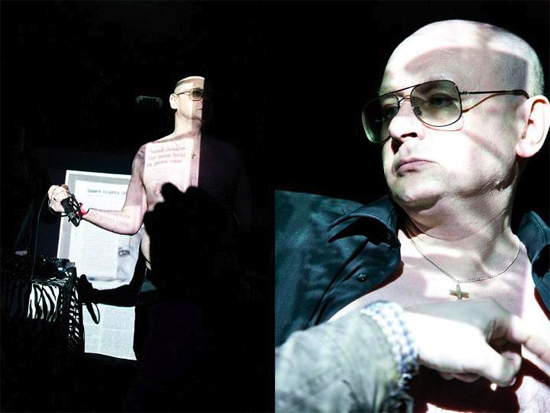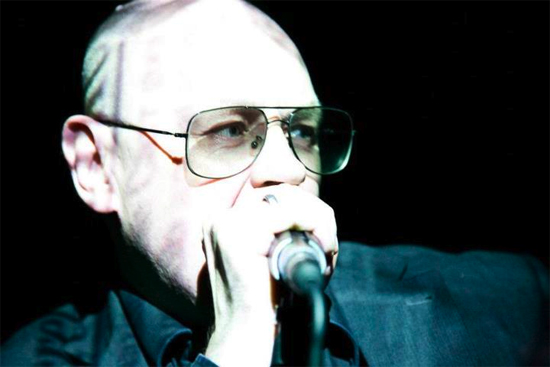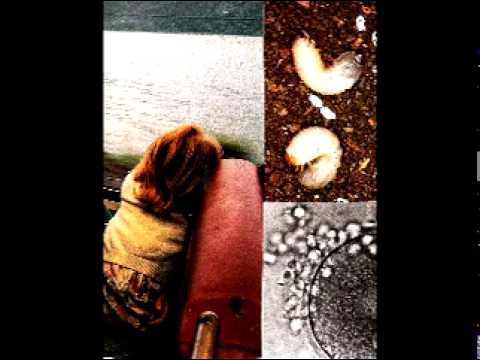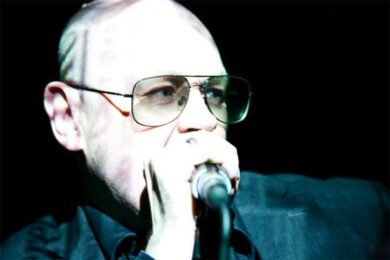30 years is a long time in music, and if that 30 years has been remarkable for its commitment to some of the most disturbing subject matter and extreme approaches to sound creation ever devised, then it stops looking like anything as prosaic as a career and takes on the characteristics of a holy mission or madman’s quest. Yet this has been Philip Best’s approach since the early ’80s.
Best is still most notorious for his periods of involvement in Whitehouse – still a cause celebre amongst fans of extreme sonics (as well as persona non grata to many) for their incorporation of ‘difficult’ subject matter such as serial killers and sexual violence as well as their blistering, high-end noise assaults. But outside of that work with Whitehouse founder William Bennett, Best has also found time to collaborate with an array of left-field noise agitators, ranging from Ramleh and Skullflower to Merzbow, as well as release a book of his artwork (American Campgrounds, published by Creation Books in 2010).
The last few years have seen him revert to his on/off moniker, Consumer Electronics, who are currently preparing for a show at London’s Buffalo Bar this Thursday, 12th July, whilst completing work on a forthcoming album, Estuary English. The Quietus met up with Best to talk about his extreme artistic approach and a commitment to The Dark Stuff that stretches back three decades.
You started early. I heard you were about 14?
Philip Best: My parents may say that I started even earlier, but let’s put it at 14. I did a concert at my school governor’s open evening. They had this balcony set up with the governors and visiting dignitaries on. The teachers had a band, you can imagine what it was like. They’d just got out of teacher training and were doing Buddy Holly covers. I said ‘I do music. Go on, let me’, and they said ‘Oh, okay then.’ So I got this shortwave radio which the PA guy mic’ed up and I tuned it in to the most obnoxious nonsense. He buggers off and goes for his pub lunch, so I go and push the fader up on the desk and it just goes WHOOOSH! Everyone’s looking at me. The teachers and the governors are looking aghast.
After ten minutes I looked over – this is before I joined Whitehouse, before I’d done any singing or anything like that – and I saw this microphone there. It just so happened that I’d been writing some lyrics. There was one called ‘Vibro Masturbator’: "Vibro masturbator/Clitoral stimulator/Magic fingers find the way…". Doggerel, but good doggerel. I saw this mic and I thought ‘okay.’ I didn’t even know that the thing would be on. I went up to it and said ‘FUCK OFF!’ and lo and behold it came out! I had everybody’s attention. Everyone’s looking at me. I’ve done it now, there’s no way back.
I just reeled through the Philip Best song book in fifteen minutes. It really was a damascene conversion, the epiphany to end all epiphanies, though not for the audience of course. When it finished I just did the classic thing: turned the radio off, picked it up and left. I didn’t want to hang around and explain the lyrics of ‘Vibro Masturbator’ to the headmaster. Apparently they haven’t had a governors evening with live music since.
So what was it that led to your joining Whitehouse?
PB: My association with them began as a schoolboy. I sent them tapes of obnoxious noise, which is now pretty much de rigueur for any self-respecting schoolboy, but at the time was not quite so common. I ran away from home to join. We’re talking about the early 1980s, when there wasn’t the same level of acceptance for powerful, obnoxious electronic music that there may be now.
What was it that led you toward such confrontational material?
PB: It was just thinking that nothing was good enough. Making your own music because you were dissatisfied with whatever there was. I couldn’t stand any of the music that was around. It was horrible. It sounds ridiculous now but I was very puritanical about what constituted music. I can think of one or two groups that were incredible at the time who I dismissed out of hand and thought of as being of no interest whatsoever.
It was a comic situation in a way, but I think you need that single minded purity of vision to have the strength to create something good and then stand by it. You have to be a brilliant critic of yourself and a terrible critic of other people. You can’t recognise the other things that are happening because you are so single mindedly pursuing your own dogged vision.
The themes of your work have left you open to a lot of criticism.
PB: I actually think everything I do is perfectly acceptable, but there’s always been something that other people have taken exception to. I hear a lot of different criticisms aimed at me. One is "You’re only doing it to shock". Not true at all. I would really love a quiet life. I would have loved it if at those early Whitehouse shows the sound guy had given us the kind of volume that the music and the dedication merited, instead of getting into silly arguments with us about what was and what wasn’t music.
People now can’t appreciate how difficult it was to do an electronic music show in a standard rock venue in the late ’70s and early ’80s. Electronic music was either something that was in an academic situation, and thus acceptable, or it was a bunch of hippies noodling at the London Musicians Co-op. What Whitehouse did was to take this electronic music and play it in pubs and clubs. I remember seeing them playing with Flux of Pink Indians and those types of bands. It sounds ridiculous now but you really were in trouble with the sound guy if you didn’t have a drum kit. In London it was like punk never happened. Soundmen were these failed pub rockers who didn’t want to get their equipment dirty.
Whitehouse were always very professional, very respectful and never sought confrontation for the sake of it. It’s always something which has got in the way. It’s tiresome, to be honest. I’ve always liked music that’s harsh and violent because of the physical reaction. Nothing ideological or anything like that, simply because of the physical sensation. Playing live is the essence of all of these things. You work hard on records, but playing live is really what it’s all about. Both in terms of performing but also for the audience. It’s the best way to experience this kind of music.

I’ve read interviews where you talk about the volume and intensity of a show bringing out a feeling of transcendence. That almost sounds a bit hippy.
PB: Yeah, but not through playing flutes sat on your knees and wishing for world harmony. Certainly late Whitehouse interviews did veer dangerously into that spiritual territory. We’re essentially talking about states that are very difficult to articulate through language. You’re going to a place where you never thought you’d be at the start of the show, but it isn’t like following a map. Ideally, as a performer, you want to be living at the very edge of the experience, because it brings the best performance out of you and you get the strongest feelings through doing it. Hopefully the audience can partake as well. There’s nothing worse than a guy on stage going through the motions. It’s soul destroying. You feel terrible for the performer themselves as this wonderful opportunity has been lost.
You read about actors getting stage fright, like what happened with Stephen Fry. I can’t imagine anything worse! I’m terrible at going to gigs because I hate going and seeing a stage and knowing that I’m not going to be on it. Seriously, if there was a stage in the corner I’d be looking over your shoulder longingly. William Bennett [Whitehouse founder] and myself, we’re both old troopers at heart. We love the smell of the grease paint. We were aware of a certain ridiculousness about it, but were deadly serious, because the one place you don’t want to be found out is onstage.
With the Whitehouse live show, as well as with Consumer Electronics, there is a certain stage-y-ness to it. Calling it silly might be putting too fine a point on it…
PB: Obviously people are going to have all sorts of different reactions. People are going to think it’s silly, some people are going to think it’s crude, amusing, stupid, disgusting. All that’s fine. There’s no set, prescribed reaction. I’m not looking toward bringing people to a specific state, nor am I projecting a certain thing. I’m just setting up a series of scenarios and exploring certain states. Some of them are supposed to be silly, but some have a serious intent. I almost feel it’s a kind of theatre, with characters. I like the word ‘playful.’ I think you can have a sense of humour about things but also be incredibly serious about what you do. I wouldn’t spend my life – every day – doing this if I thought it was inconsequential.
One of the things that can put me off a lot of extreme music, black metal for example, is it’s absolute insistence that it’s 100% serious. That just makes it seem more hilarious. Whereas if you experience transgressive material that does have a sense of humour it becomes a lot more powerful.
PB: I would agree with you entirely. I think black metal’s a good example. It’s such a po-faced genre but all the practitioners are innately ridiculous. People who celebrate that ridiculousness are a breath of fresh air.
I was looking at some of the YouTube clips of Consumer Electronics recently and was struck by how well the music went with images from your American Campgrounds book. Do you see your artwork as being an essential part of what Consumer Electronics are doing?
PB: I didn’t create those videos on YouTube. They’re fan videos. But when I saw them I was struck by them. It was like, ‘Why didn’t I think of this before?’ I’ve always done art which has gone alongside the music, if a record needed a cover, for example. But I would say that over the last few years the art has ceased to be something that tries to package, explain or market the music. Rather, the art and the music mesh and inspire each other. Essentially it’s all becoming part of one work now. The last two Consumer Electronics albums both had very simple sleeves. I didn’t use my artwork because I thought of it as separate. But the next record is going to have a full booklet featuring artwork by myself and we’re doing a film to show at the next concert, so it’s all coming together. I think I’m becoming better as an artist. I’ll want to make something and it starts me thinking about other things, some music or some lyrics, and you’ll have them bleeding into each other. Things seem to have a life beyond the frame of what you’re working on.
How do things start coming together for you? Do you have to wait for a lightning bolt of inspiration or do you work more methodically?
PB: It depends. I have to say how difficult it is to make records. You’ve made so many in the past and you’ve set the bar really high. You’re aware that you’ve made these albums that people are fond of, and which you think are good as well. You have to make a record that’s strong in every way. That builds upon the material that’s gone before it.
The lyrics take a lot of time. There’s a lot of my life in there. Experiences I’ve had, people I’ve met, situations I’ve been in. That kind of material can come out pretty quickly, but this isn’t some kind of therapy. It’s got to be polished. Not just the obvious stuff like making it scan, but stuff like having to clarify things or make them have multiple meanings. When you write lyrics you’re constantly defining them, and when you decide what it is you’re saying then you really want to make sure you hammer it home. That it really strikes the target. You don’t want any flab in there. You’ve got the music and the lyrics and the performance and when you put them together you’ve done the best possible job you can do. You can’t be lazy and half-arsed about it. That’s why it takes so long to make records.
That very deliberate use of lyrics was a feature in Whitehouse as well, wasn’t it? Certain tracks seemed concerned with Neuro Linguistic Programming techniques.
PB: Yes, but a lot of the Neuro Linguistic Programming stuff was William’s baby. I’m not looking to elicit a definite response. The songs that I write are loaded with personal meanings, which gives them a particular resonance for me, which I can then transmit to other people without being too specific about things. There isn’t a meaning which is coded that people can then extract at the end of the process. That’s not my style. I think people can engage with the work and get whatever they want from it. They’re allowed to be wrong.
So where does responsibility come in then? Obviously you do deal with some fairly uncomfortable subject matter…
PB: I don’t want to hold people’s hands. I think they can find their own fucking way.
A case of crediting your audience with a bit of nous…
PB: Absolutely. And by the same token if they behave like bloody idiots I’ve got no responsibility for that. They’re bloody idiots.
The Power Electronics scene does seem to have a very defined aesthetic. At the recent Broken Flag weekender I saw a lot of releases festooned with Nazi and BDSM imagery, for example. Do you still feel connected to that scene?
PB: On paper I like the idea of Power Electronics. A musical scene that is pretty much devoted to certain extreme acts and certain extreme images and relentlessly follows its vision all the way through. And yet when you see it, it’s a disappointment. I’ve never really liked anything too prescriptive with regards to music. Imagery, lyrics or whatever. If something’s as narrow a church as Power Electronics or black metal appear to be, then you don’t want to spend a lot of time with them.
There’s way too many people making music these days. There’s too much. I was thinking some form of taxation or something…
I was thinking a cull.
PB: Years ago you had to go to a professional recording studio and convince engineers that you were serious about the sound you were making. That they should pay as much attention to recording you as they would a regular band. You then had to go and get your records professionally manufactured. Get them cut on Shaftsbury Avenue at Porky’s Prime Cuts and tell Porky to spend as much time cutting your album as he did Led Zeppelin III (and he did, God bless him). You had to pay the money, then you had to convince record shops to buy the records. If you’re going to make that much effort then you have to make sure the music you make is worth the heartache and the expense. Everything seems to be flattened out by the mode of delivery now. Music is too ubiquitous, less of a special event.
So is there anyone out there making stuff that you feel a connection with?
PB: Dominick Fernow [Prurient/Vatican Shadow] has been doing some interesting things. He’s a bright guy and someone I would listen to. There’s always something that you like in other artists, but there’s always something that disappoints. I would suggest a creative misreading of them. You take what you want and turn it to your own purposes so that it becomes grist to your mill. I’ve found one of the most productive ways of doing it is through an active, willed misreading.
Does that mean that you listen to a piece of work with an agenda or is it a kind of bibliomancy? Are you conscious of what you’re looking for?
PB: I would look at anything with an open mind, searching for the slightest hint that my agenda could be catered to. I’m not going to force a reading on it. There’s a heterodoxy of critical reaction, a set way of reading something. It’s pretty obvious to any student of deconstruction that there are ways into an artist’s work that aren’t the major portals. You can go into their work in other ways and explore not just the work, but all the other issues that arise through your misreading.
Consumer Electronics play Islington Buffalo Bar on Thursday 12th July. Advance tickets are available from funtime_entertainments@hotmail.com . A limited amount of tickets will be available on the door. Head to the event page for more information.
Consumer Electronics also plays Incubate Festival, Tilburg, on Saturday 15th December. More information about the festival, which the Quietus are media partners of, here.
Photos by Karolina Urbaniak




